English Language Department
| Vision: | Affective Learners, Effective Communicators |
| Mission: | To provide a conducive environment for the learning and use of the English Language |
| Tag Line: | Today a Reader, Tomorrow a Leader |
Our Programmes
1) English Week
English Language Week is an annual school event that creates a platform for students to learn and love the language while celebrating creativity and promoting excellence in its use. Tapping on students’ love for mysteries and suspense, the theme for 2022 was ‘Who’s the spy among us?’. The week started with the overarching mission of finding a spy working for ‘IHateEL.com’ who has infiltrated East Spring Primary School to wreck havoc to English learning materials.
Through various fringe activities conducted in class during English lessons, students were actively engaged in age-appropriate activities that were created to suit the needs of the diverse learners in school. These activities include I-Spy-and-Search, Cracking the Secret Code in Spelling, Spotting Grammatical Mistakes and giving their creative spin to What Happens to The Spy in The End through a writing activity. Not only did students enjoy deducing the identity of the spy through clues they had gathered, but they also experienced the joy of learning the English Language!

2) Reading Programme [Vitamin E]
Vitamin E encompasses all the reading programmes planned for our E’Lights. These include discussions of current affairs in the English classrooms, introduction of differentiated magazines for the various levels as well as scheduled library periods to bring books closer to our students.
E stands for English and we hope that through these programmes that have been put in place, students’ language competencies will be strengthened, just like how vitamins provide us with essential nutrients for healthy living.
In order to provide authentic reading materials that extend beyond the curriculum, the department has adopted them from various reading sources. These include The Little Red Dot newspaper (for Primary 4 to 6) and an array of magazines, namely I Love Reading, Whiz magazine, Ace magazine, The Cricket and I-Magazine. These reading resources are targeted at different primary and progress levels, and are well-liked by students for the interesting content, relevant topics and colourful graphics.
A new initiative has also been implemented since 2019 to encourage students to engage in meaningful conversations on current affairs through articles in the Little Red Dot newspaper. Through the rich discussions held in class, students become critical thinkers by reflecting on topics and questions posed. Through this initiative, we hope to develop the 21st century competencies in our students whereby each student is a concerned citizen who has a strong sense of civic responsibility, is informed about Singapore and the world, and takes an active part in bettering the lives of others around them.
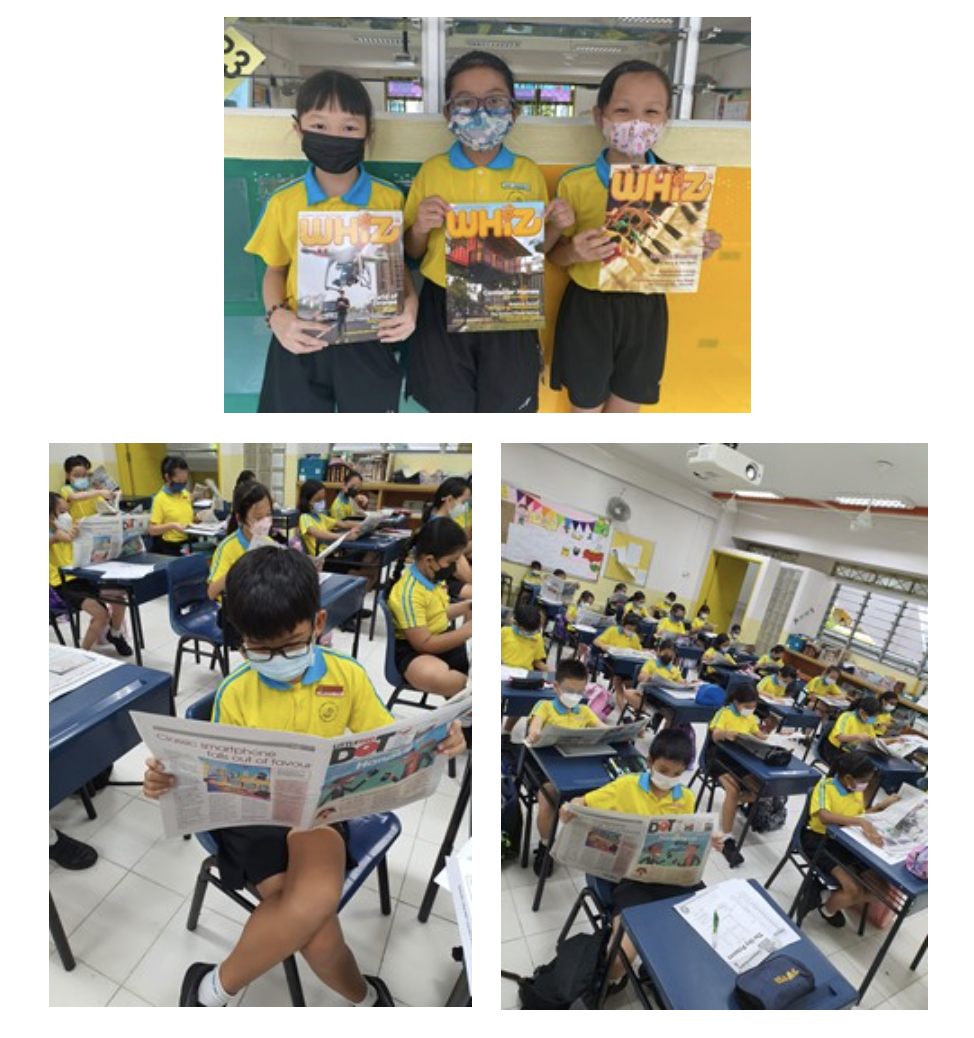
3) Library Programmes
Students are also supported by reading programmes organised by the School Library, where termly reading activities are held to encourage more readership. Activities include Blind Date with a Book, Golden Ticket, Animals Hidden in Our Book Jungle, A Library of My Own and so forth. In alignment with these library activities, all classes also have their own mini-class library where students donate their own books to be shared with their classmates. Prior to COVID-19 restrictions, the school also liaises with the National Library Board (NLB) to hold the biannual “Books To Go” event. Books from the NLB are brought to the school where students can easily have access to browse and borrow them. The school hopes to inculcate a love for reading in all students and aims to build a vibrant reading culture in the school.
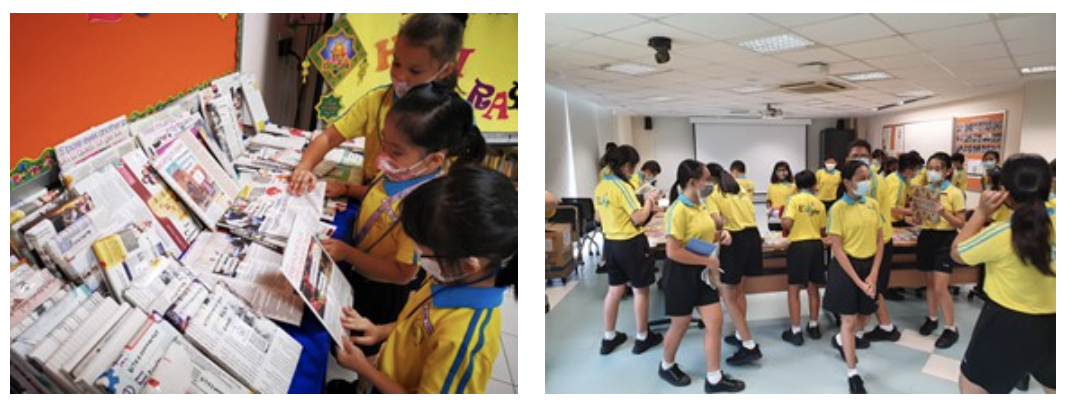
4) P3 and P4 Theatre Experience
The Theatre Experience aims to provide students with a holistic learning experience that is essential to students’ development. By bringing students to watch a play, we aim to give students exposure to the performing arts. As students sing along with the actors in the play, they get to practise their oracy skills, learn about language expressions as well as expand their vocabulary.
In previous years, students have watched entertaining and educational plays entitled Knuffle Bunny: A Cautionary Musical, The Ant and The Caterpillar and Three Little Pigs. Students also get to learn about the etiquettes of being a good audience when watching a play.
This year the P4 students will be watching an educational drama performance entitled The Caged Parrot and go through a workshop. With music, songs, movement, role playing, and verbalisation, students will join the Caged Parrot and the Merchant as they explore the dilemmas, the adventures, and the journey towards realising the meaning of happiness and that there are different perspectives to it.
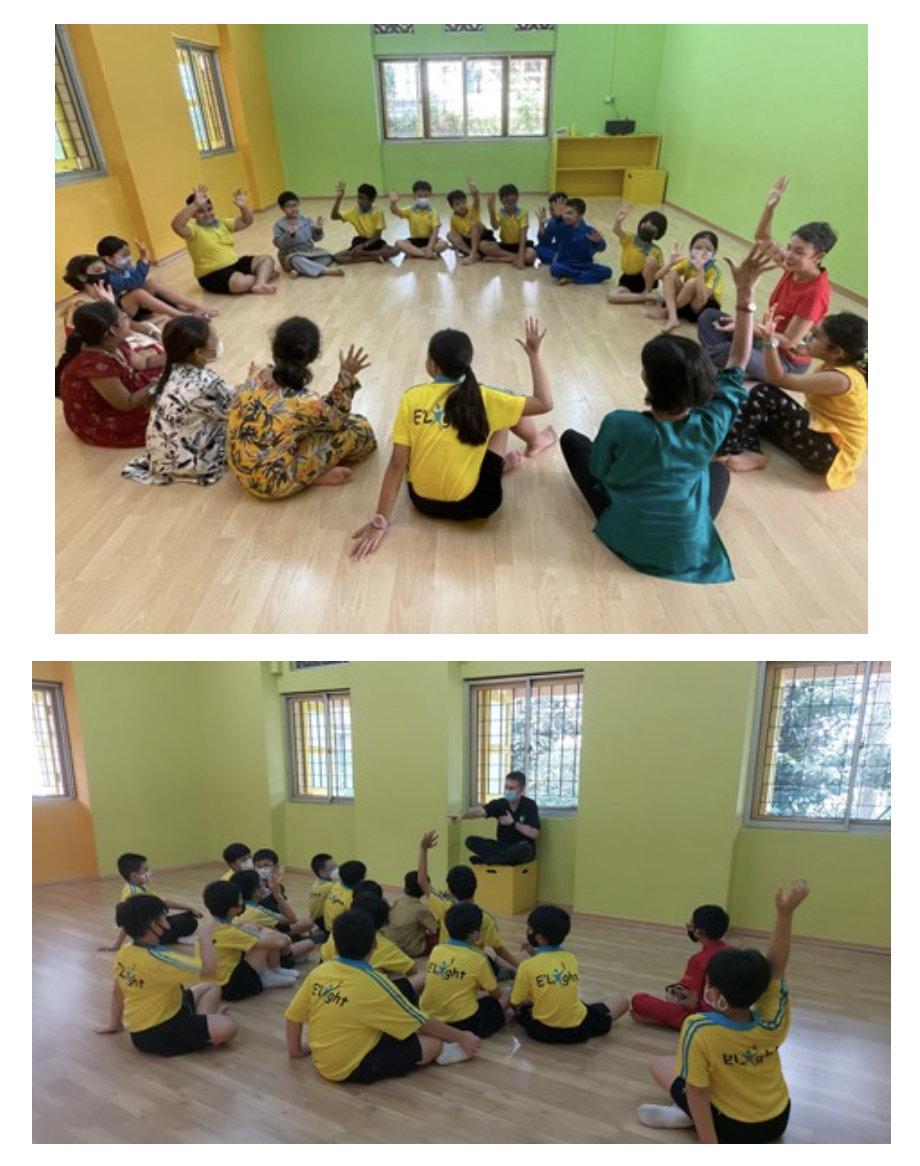
5) P1 & P2 Celebrating Talents
Primary One and Two students are given this platform to showcase their performing talents. Each class will perform in the form of a song, a skit, poetry recitation or Readers’ Theatre based on their collective consensus. This whole-class involvement will give students an opportunity to learn to collaboratively work together and showcase their different linguistic skills.
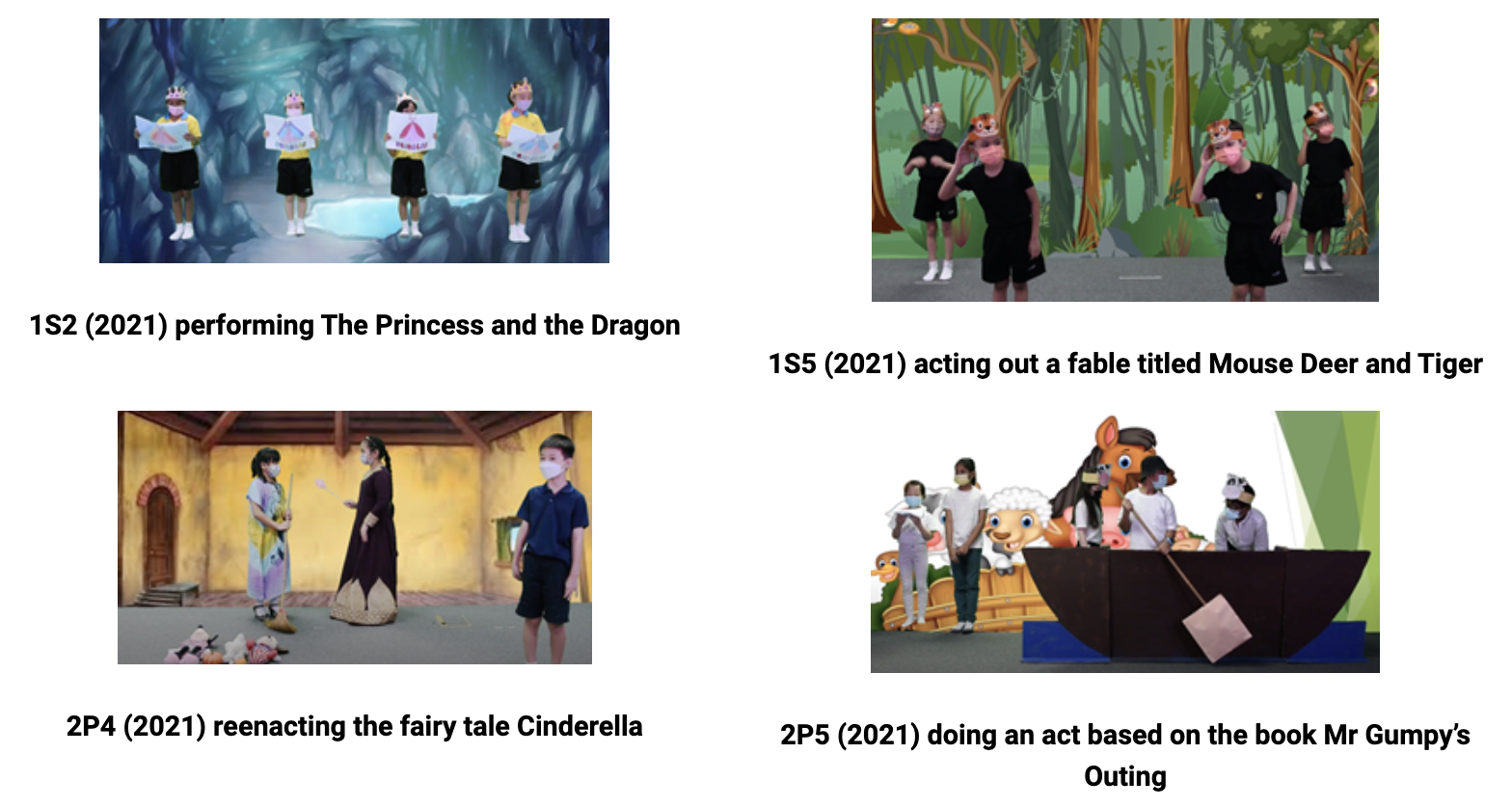
6) External Competition
In order to give exposure to our students to compete at a national platform, selected students are given the opportunity to participate in external English competitions. Previous competitions that E’Lights have taken part in include public speaking competitions such as the National Straits Times Spelling Bee Competition. Students will be given ample training and practice to build up on their linguistic skills prior to the competitions. We hope through these platforms, students will learn to become confident, self-directed learners who learn important life skills such as perseverance, hard work and sportsmanship.
7) STELLAR-Based Activities
STELLAR-based activities provide experiences that will elicit specific target structures and vocabulary introduced by the Books/readers during the Shared book approach. An activity is selected in relation to the story where students will be given the experience when they are engaged in the activity. Teachers will proceed to document their experiences in the form of a class dictated story where they will write a recount. The Class Writing can be seen as the whole after the parts have been taught. This provides opportunities for students to engage in a shared experience before discussing and writing about it. The students will proceed to write an individual recount.
For example: the primary twos embark on the topic of butterflies through the book ‘ a butterfly is born’.
Students will be given the opportunity to engage themselves with the experience of observing the actual butterfly’s life cycle. From there, they will exhibit their knowledge and creativity by creating a butterfly craft (Art). They will then write on their experience as a recount (English). They will also embark on writing an information report on butterflies or any similar insects through group collaboration.
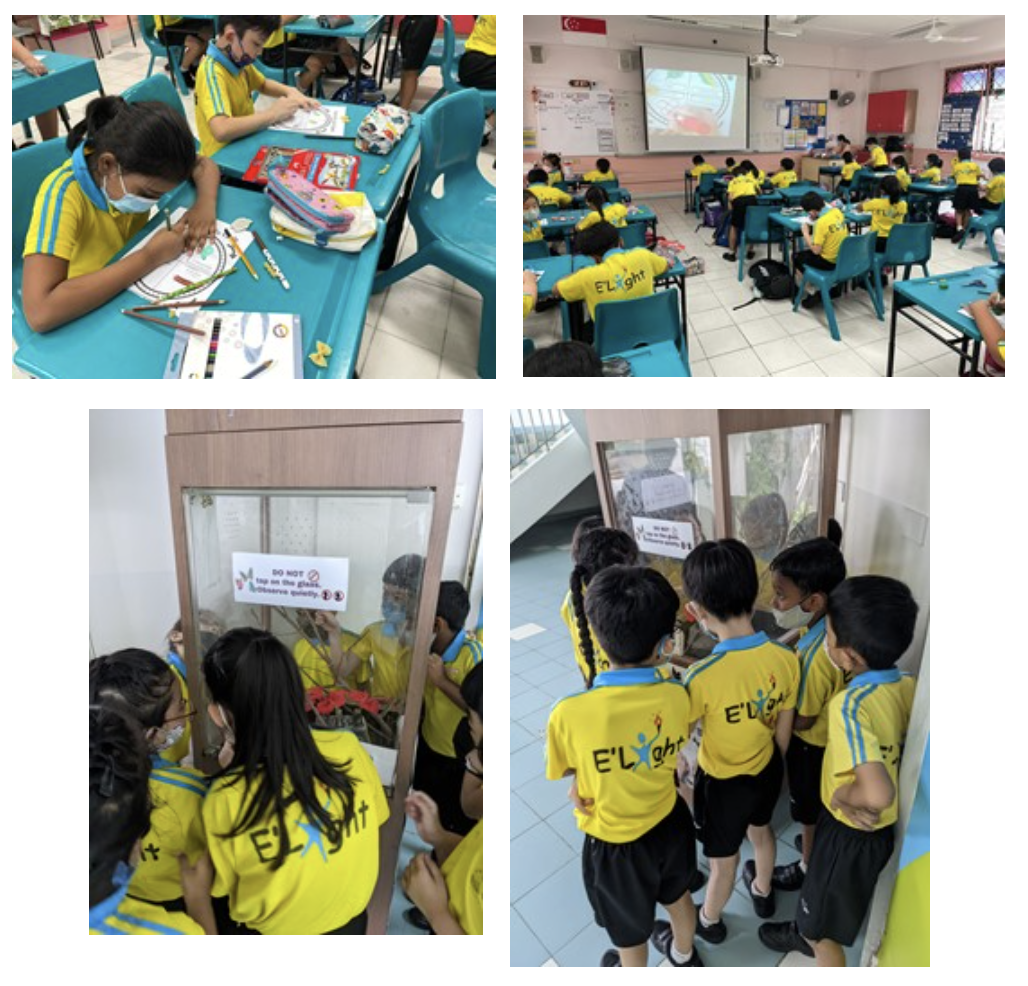
8) Literacy Support Programmes
The Learning Support Programme for English (LSP) is an early intervention programme aimed at providing additional support to pupils who enter Primary 1 with weak English language and literacy skills. Its objective is to equip the pupils with basic reading and spelling skills. Pupils are identified for the LSP through the Early Literacy Indicators (ELI), a group-screening instrument developed by MOE, at the beginning of each year. Pupils attaining low levels on the ELI are placed in the LSP for additional support. The LSP lessons are conducted by our two trained Learning Support Teachers during curriculum time for one period a day.
Secondly, the School-based Dyslexia Remediation (SDR) programme is a two-year intervention programme for Primary 3 and 4 students. These students are identified for support through a systematic screening process for dyslexia conducted at the end of Primary 2. The programme is conducted in small groups by our two trained SDR teachers using a remediation curriculum designed by MOE Reading Specialists. The classes are held three times a week for an hour after school.
The third programme is the Reading Remediation Programme (RRP), which is also aimed to provide additional support for P3 and P4 students who have less difficulty in reading. Students are exposed to a range of coping strategies for reading comprehension which will enable them to better manage their learning in the regular classroom. The classes are held twice weekly after school hours and taught by our four English teachers.
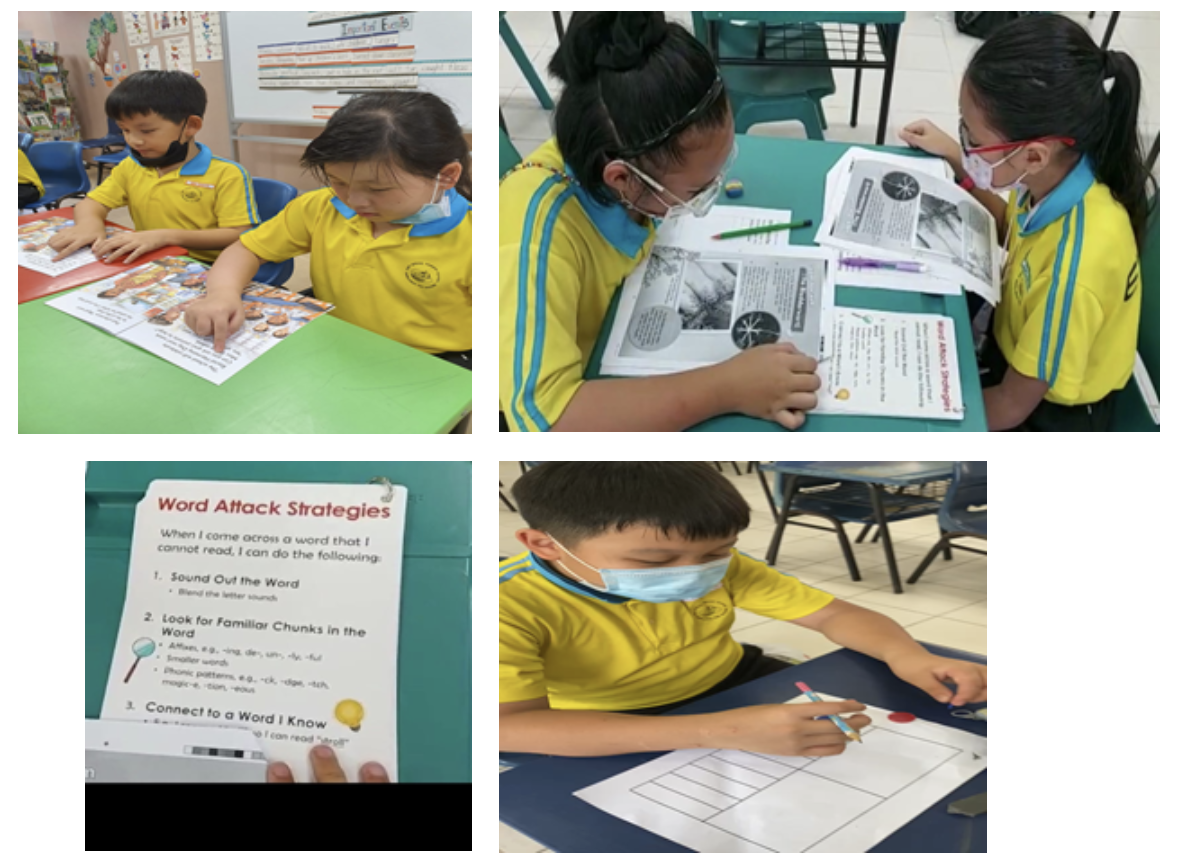
9) Project Pencilback
19 Primary 4 High Progress writers have been selected to attend a 9-week writing and illustration programme conducted by student-instructors from the School of the Arts (SOTA). The aim of this programme is to expose the Primary 4 students to drawing and creative writing techniques that will eventually help them when they create their own illustrations and compositions for future group projects.
The curriculum includes exposing students to the various aspects of the literary arts such as developing multi-dimensional characters, portraying conflicts, and utilising language and tone to create specific moods in stories. Students will also learn to develop artistic ideas in designing their characters upon understanding the colour theory, and learning about line quality, scales and perspectives.
At the end of this programme, the students’ creative work will be published in the form of a booklet which will also serve as a souvenir for their participation in this project.
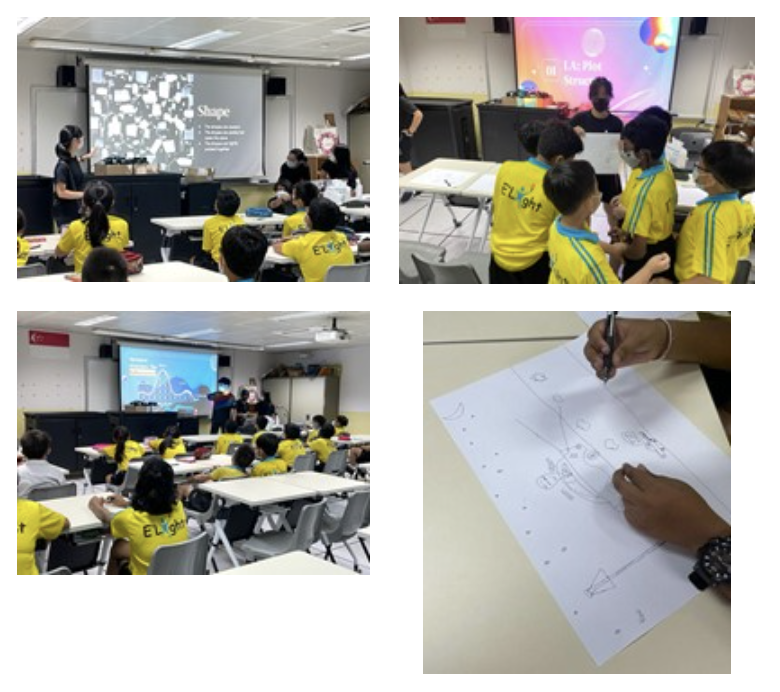
Important Links
https://www.nlb.gov.sg/
https://eresources.nlb.gov.sg/</b></b></b></b></b></b>

